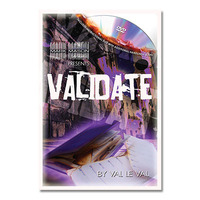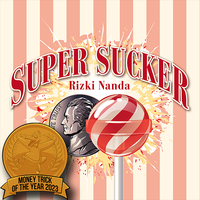
 Fresh, provocative thinking -- room for this material to grow even more
Report this review
Fresh, provocative thinking -- room for this material to grow even more
Report this review
Verified buyer
Pro Privacy ON
(login to see reviewer names)
on October 22nd, 2014
Patrick is a strong, unique voice that you will benefit from hearing. His analysis of what makes
for effective dual reality methods is hugely important for anyone doing this kind of work -- he has
an approach that, applied well, makes these methods bulletproof when guests talk to each other after
a performance. There are many interesting ideas here and avenues for exploration. This is well
worth $30 any day.
The "can be improved" area of this material has one consistent theme -- there are several occasions when, and I'm open to being wrong about this, Patrick outsmarts himself. These are moments, and I'll try to highlight some below, when he is too confident in his verbal framing of a situation. In one case it is a method that I think needs a few other layers of deception to be bulletproof, in another it is an effect that isn't clear in some circumstances because he is doing so much verbal dancing to reframe something as a choice that wasn't, and at another point a routine has poor dramatic build -- he creates a justification for why a certain procedure is actually harder than the earlier phase; but it rings empty.
This is not, for a second, to say that the work here isn't worth your attention -- it's being aware of both what is working and what isn't.
Let's take a look at some of the items that stand out, both the high points and ways in which this material can be further developed.
Marker prediction: Eugene Burger has written about the power of "magic on the way" -- strong, unexpected, short magical moments that break up the process of a longer piece (i.e. rather than just removing a match to light a candle, having the matchbox open itself -- a beautiful moment that injects a wonderful texture into a longer piece and creates an atmosphere of magic). As part of his opening sequence, Patrick will influence decisions made by guests and he will be writing his target down on posterboard. Rather than just removing a marker and going at it, Patrick reveals that he has predicted which color marker the guests will choose for him to use. It is a beautiful moment with a highly pracical method. Were there a sequence in my act that this would make sense as part of -- it would be on stage tomorrow.
Clock prediction: This is an interesting method that is worth thinking about. I tend to care very little whether an effect fools me or not -- when it comes to making a decision about developing it for my work -- because I understand that I analyze magic with a different set of tools and assumptions than my audience is using. Here, though, my seeing the method during the performance was a personal red flag -- because I don't feel it was "magician thinking" that led to the solution. I think there is a certain percentage of analytical guests for whom this method is transparent. Patrick talks about how this is massaged during the performance and how the memory of what happened when gets re-shuffled to protect the method. I'm sure he is right that this is true for many guests -- but I don't think that percentage is 100
It is also worth mentioning that the sight gag he uses at the beginning of this sequence is something I would have thought was the funniest thing ever -- when I was 11.
Here, it feels like a performer who is trying too hard to be funny; and he comes across as immature in a negative way. For the right group, I can see this playing -- but I think it is going to work against the performer far more often than it will help him. You'll want to think carefully about who you are, who your audience is, and how you want them to perceive you before using this...
Erasing guests' memories (not Patrick's titles for any of these -- incidentally -- I'm too lazy to find those): This is a smart, smart, smart sequence that contains a lot of important lessons -- the power of a committing to a clear dramatic premise, how to make dual reality work so that the post-show conversations fit perfectly, and just some great individual techniques and solutions. A highlight.
Over the phone lie detecting: More damn fine thinking. A highlight.
Piece with a card and drawn symbols: A very solid opening phase with great thinking. The second phase (incorporating the infinity symbol), despite Patrick's smart verbal dancing, did not register as a clear effect.
30 Card Poker Deal: as someone who uses the ten card poker deal professionally; the first phase here is extremely interesting in that it allows for the guest to legitimately choose every single card in the hand. I will be exploring making this a phase of my current routine. Patrick's second phase lowers the impossibility of the procedure, with a hollow verbal excuse. The third phase is remarkable and some very good thinking that can be applied to other plots.
Definitely a buy if this genre of material is of any interest to you.
The "can be improved" area of this material has one consistent theme -- there are several occasions when, and I'm open to being wrong about this, Patrick outsmarts himself. These are moments, and I'll try to highlight some below, when he is too confident in his verbal framing of a situation. In one case it is a method that I think needs a few other layers of deception to be bulletproof, in another it is an effect that isn't clear in some circumstances because he is doing so much verbal dancing to reframe something as a choice that wasn't, and at another point a routine has poor dramatic build -- he creates a justification for why a certain procedure is actually harder than the earlier phase; but it rings empty.
This is not, for a second, to say that the work here isn't worth your attention -- it's being aware of both what is working and what isn't.
Let's take a look at some of the items that stand out, both the high points and ways in which this material can be further developed.
Marker prediction: Eugene Burger has written about the power of "magic on the way" -- strong, unexpected, short magical moments that break up the process of a longer piece (i.e. rather than just removing a match to light a candle, having the matchbox open itself -- a beautiful moment that injects a wonderful texture into a longer piece and creates an atmosphere of magic). As part of his opening sequence, Patrick will influence decisions made by guests and he will be writing his target down on posterboard. Rather than just removing a marker and going at it, Patrick reveals that he has predicted which color marker the guests will choose for him to use. It is a beautiful moment with a highly pracical method. Were there a sequence in my act that this would make sense as part of -- it would be on stage tomorrow.
Clock prediction: This is an interesting method that is worth thinking about. I tend to care very little whether an effect fools me or not -- when it comes to making a decision about developing it for my work -- because I understand that I analyze magic with a different set of tools and assumptions than my audience is using. Here, though, my seeing the method during the performance was a personal red flag -- because I don't feel it was "magician thinking" that led to the solution. I think there is a certain percentage of analytical guests for whom this method is transparent. Patrick talks about how this is massaged during the performance and how the memory of what happened when gets re-shuffled to protect the method. I'm sure he is right that this is true for many guests -- but I don't think that percentage is 100
It is also worth mentioning that the sight gag he uses at the beginning of this sequence is something I would have thought was the funniest thing ever -- when I was 11.
Here, it feels like a performer who is trying too hard to be funny; and he comes across as immature in a negative way. For the right group, I can see this playing -- but I think it is going to work against the performer far more often than it will help him. You'll want to think carefully about who you are, who your audience is, and how you want them to perceive you before using this...
Erasing guests' memories (not Patrick's titles for any of these -- incidentally -- I'm too lazy to find those): This is a smart, smart, smart sequence that contains a lot of important lessons -- the power of a committing to a clear dramatic premise, how to make dual reality work so that the post-show conversations fit perfectly, and just some great individual techniques and solutions. A highlight.
Over the phone lie detecting: More damn fine thinking. A highlight.
Piece with a card and drawn symbols: A very solid opening phase with great thinking. The second phase (incorporating the infinity symbol), despite Patrick's smart verbal dancing, did not register as a clear effect.
30 Card Poker Deal: as someone who uses the ten card poker deal professionally; the first phase here is extremely interesting in that it allows for the guest to legitimately choose every single card in the hand. I will be exploring making this a phase of my current routine. Patrick's second phase lowers the impossibility of the procedure, with a hollow verbal excuse. The third phase is remarkable and some very good thinking that can be applied to other plots.
Definitely a buy if this genre of material is of any interest to you.
Add a comment
OPEN BOX
$24.51 (29% OFF)
59
Bestsellers
See all bestsellers
COOL BOX
24% now claimed
0
5
:
1
1
:
4
3
remaining

Act Builder beta



























